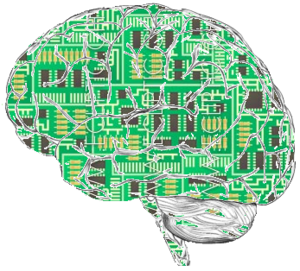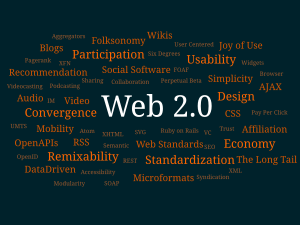Artificial Intelligence is commonly thought of as a set of practices mimicking the human brain. However, recent history shows us that there is a better approach, facilitating human-generated data and aggregating it in a meaningful way.
In his excellent series of books, started with Ender’s Game, Orson Scott Card introduced an interesting character: A sentient being (codenamed ‘Jane’) emerging from the completely virtual world of the Internet. To my best of knowledge, no such being exists as of yet, nor does it seem likely that it could come to existence within the near future. This ultimate dream (or nightmare) of humanity is still far away. However, progress in the field of artificial intelligence has accelerated a great deal ever since the Internet came into our lives.
As with my previous article on robots, I’d like to look at matters a little differently. When I looked up the definition for artificial intelligence in the Wikipedia, I was somewhat dissapointed:
Artificial intelligence (AI) is the intelligence of machines and the branch of computer science which aims to create it. Textbooks define the field as “the study and design of intelligent agents,” where an intelligent agent is a system that perceives its environment and takes actions which maximize its chances of success. John McCarthy, who coined the term in 1956, defines it as “the science and engineering of making intelligent machines.”
The use of the term intelligence within the definition kind of smells like a circular reference. Also, it seems to talk of the process and less of the essence. Looking up ‘intelligence’ in Wikipedia does not add much for a better understanding:
Intelligence is an umbrella term used to describe a property of the mind that encompasses many related abilities, such as the capacities to reason, to plan, to solve problems, to think abstractly, to comprehend ideas, to use language, and to learn. There are several ways to define intelligence. In some cases, intelligence may include traits such as creativity, personality, character, knowledge, or wisdom. However there is no agreement on which traits define the phenomenon of intelligence agreed upon by a majority across the various concerned disciplines.
Probably the most down to earth, yet still ambiguous definition, is the one for ‘intelligent agent':
- Image may be NSFW.
Clik here to view.- Non-Intelligent Agent. Image via Wikipedia
In artificial intelligence, an intelligent agent (IA) is an autonomous entity which observes and acts upon an environment (i.e. it is an agent) and directs its activity towards achieving goals (i.e. it is rational). Intelligent agents may also learn or use knowledge to achieve their goals. They may be very simple or very complex: a reflex machine such as a thermostat is an intelligent agent, as is a human being, as is a community of human beings working together towards a goal.
Looking over these three definitions I’d like to key out what I believe to be the prominent elements of artificial intelligence. First, the autonomous nature of the being. This can be metaphorically described as “having a hood”. There’s an engine under the hood, it somehow operates, but it is unnecessary (and at times, impossible) to know exactly what’s going on in there.
Second, the element of knowledge, either preexistent or accumulated by some learning process. This gives context to the AI. For example, definitions of “too hot” and “too cold”. These are not absolute scientific truths, but rather subjective, context-based knowledge. The “too hot” definition for a living creature is not the “too hot” for a car engine. Thus, a thermostat in a car engine and a thermostat of an air conditioner might have the same mechanics, but different contexts embedded within.
Third, a purpose. The AI is attempting to achieve some goal. Without a purpose, we cannot tell whether the AI is performing well or not. In fact, a lack of purpose makes this whole discussion quite pointless.
When I talk to friends and colleagues about AI it seems as if everyone is thinking towards simulating a human’s mind (Edit: Here is excellent piece by Kasparov about AI in the chess world). This could be an interesting application, but I wouldn’t consider it the prime goal of AI. We’ve got plenty of humans in the world (and counting…), so why not employ AI for other stuff, the kind of which is hard for humans to achieve? This is actually happening in a very large scale on the Internet. Let me show you how the Internet is quickly creating many applications of AI, and why this is so. Of course, Google is leading the herd.
The Google Search is a pure example of an AI. Its purpose: Provide the user with the most relevant web content for what he needs. The mechanism (in a nutshell): A user attempts to formulate his desire by typing a few keywords, and Google searches through web-page content for the supplied keywords. Google then sorts the results using pagerank, a complex algorithm whose basic idea is: The more links are pointing towards you, the higher your relevance. The google search process exhibits autonomy (you magically get what you want [or not]) and it has a whole ocean of website metadata for knowledge.
Google Translate is another example. Its purpose: Translate text accurately from one language to the other. The mechanism: Traverse documents that have already been translated by humans, and try to compile the “best translation” for a phrase out of that. Luckily for Google, they have scanned into their systems multilingual translated content form many sources, including libraries & EU official documents. This service uses high-level machine learning algorithms to try and deduce not only the possible translations, but also the context of the term. e.g. The meaning of “mouse” relies heavily on the context: Is it a computer accessory or a cute, super-intelligent rodent?
Amazon Recommendations. When you shop at Amazon, upon viewing an item you are offered several complementary items. The purpose of this is to interest you in other products that you might not be aware of, or weren’t planning to purchase on Amazon. The recommendations are done by scanning all previous purchases by customers, and finding some sort of correlation between the product you are buying and customers who bought the same product. This particular line of service is accomplished using classic methods of data mining, a field of research that actually exposes hidden truths in our behavior. Just like Malcolm Gladwell, or Seinfeld.
The whole Web 2.0 (i.e. Community-controlled content) is also sparking up interesting applications. To see what interests people in the world, you could look at Twitter’s Trending Topics or Google’s Zeitgeist (interestingly enough, they greatly disagree). Websites such as e-pinions compile an aggregated review of a product, based on multiple reviews by users. Facebook lets you know what your friends are sharing, attempting to push more content from closer friends, and suggesting you reconnect with long-forgotten friends (to comic consequence). This list can go on and on.
So, AI found the promised lands on the Internet, simply because they are solving a problem we humans are really bad at: Processing huge amounts of data and producing useful summaries of it.Therefore, for now, the best application of AI could be coined as Aggregated Intelligence. They make no decision on their own; They statistically analyze the decisions made by numerous human users and calculate a “favorable choice” based on that data. This is opposed to many models of AI, who try to incorporate a much broader, more flexible learning mechanism, which could potentially simulate the brain.
“The semantic web“, the next hoped-for milestone in Internet evolution, promises to retrieve structured data from the sea of unstructured, free-floating text on the web. If you’ve ever wondered why this is so important, think about the possibilities for new aggregated intelligence applications for structured data. For example, you could follow news releases and offer summarized views (many of which are manually updated nowadays in sites such as Wikipedia): Who is currently the president of Pakistan? How many American soldiers are in Afghanistan right now? How many different brands of chocolate are there? etc. etc. One application that already attempts to do this is wolfram alpha, but I must say with all due respect, it’s still pretty lousy.
Related articles:
- To make smarter systems, it’s all about the data (cdixon.org)




![Reblog this post [with Zemanta] Reblog this post [with Zemanta]](http://img.zemanta.com/reblog_c.png?x-id=7744e537-c9de-4710-b0f5-662861cf4e1e)